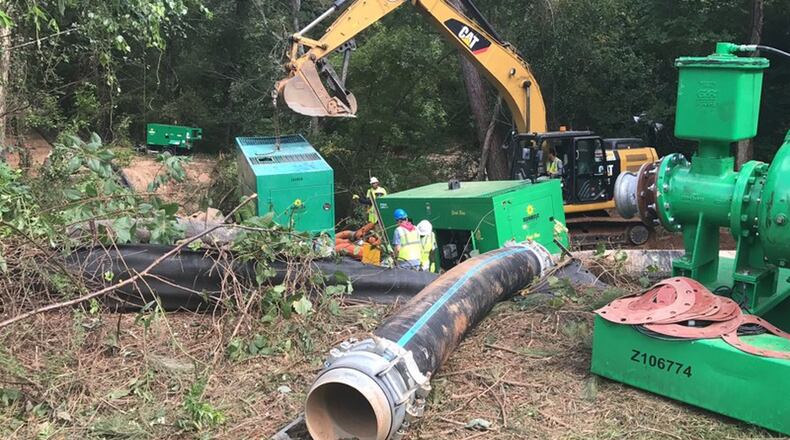DeKalb officials are scrambling to address massive sewage spills that have dumped more than 10 million gallons of raw waste into two of the county’s creeks this month.
The county reported Tuesday that 6.4 million gallons of raw sewage poured into Snapfinger Creek near Stonecrest last week, exceeding the 3.9 million gallons that polluted Nancy Creek in Brookhaven two weeks ago. It's the biggest spill in DeKalb in 11 years — since 10 million gallons contaminated Snapfinger Creek.
The latest spill, caused by a 16-inch wide tree growing through pipes, has created a public health risk by spreading fecal matter and bacteria into public waterways, said Elizabeth Ford, district health director for DeKalb. No illnesses have been reported so far as a result of the spill.
“It’s dangerous. Sewage is fecal matter, so that’s not something you want to have on your skin or your body,” Ford said. “I hope people heed the warnings to stay out of the water.”
Sewage spills contain e. coli and other bacteria that can cause fever, diarrhea and vomiting. In extreme cases, these kinds of bacteria can be deadly depending on the extent of the exposure and the victim’s overall health, Ford said.
The county completed temporary repairs on the pipes Sunday, four days after the spill near Eagle's Beak Circle south of Flat Shoals Parkway was discovered. Permanent fixes are planned.
DeKalb CEO Mike Thurmond ordered inspections of all pipes along Snapfinger and Nancy creeks, emergency inspections of the county’s 1,000 creek crossings and regular inspections of sewer lines.
Jason Ulseth, riverkeeper for the Chattahoochee River, said residents and pets should avoid polluted waterways.
“These sewer spills have both public health and environmental impacts,” Ulseth said. “It greatly increases a person’s odds of contracting an illness by coming in contact with the contaminated water.”
He said high bacteria levels at Nancy Creek have subsided. But it will take more time before bacteria dissipates from the latest spill along Snapfinger Creek.
The spills don’t affect the county’s drinking water, according to the county.
DeKalb’s water supply comes from the Chattahoochee River, upstream from where Nancy Creek feeds into Peachtree Creek before reaching the Chattahoochee, Ulseth said. The river eventually flows into West Point Lake near the Alabama border, which provides water for the city of LaGrange and Troupe County. Governments test and treat water to meet acceptable drinking water standards, he said.
DeKalb’s government has been struggling for years to repair its aging water and sewer infrastructure, but sewage spills are continuing to mount.
Through the first six months of this year, the county reported 111 spills compared to 135 in all of 2016.
The county is behind schedule on upgrading its sewer infrastructure as called for in a court agreement with federal and state environmental regulators. The consent decree requires more than $280 million of upgrades to the county's decaying sewage system in an effort to reduce spills.
Each spill can come with a fine of up to $2,000. Since 2011, the county has paid $924,000 in fines.
“As our infrastructure continues to age, the likelihood of spills continuously goes up,” Ulseth said. “Local municipalities need to do everything they possibly can to upgrade their infrastructure and capacity to keep up with growing populations and sewer demand.”
MYAJC.COM: REAL JOURNALISM. REAL LOCAL IMPACT.
The AJC's Mark Niesse keeps you updated on the latest happenings in DeKalb County government and politics. You'll find more on myAJC.com, including these stories:
Never miss a minute of what's happening in DeKalb politics. Subscribe to myAJC.com.
About the Author
Keep Reading
The Latest
Featured




